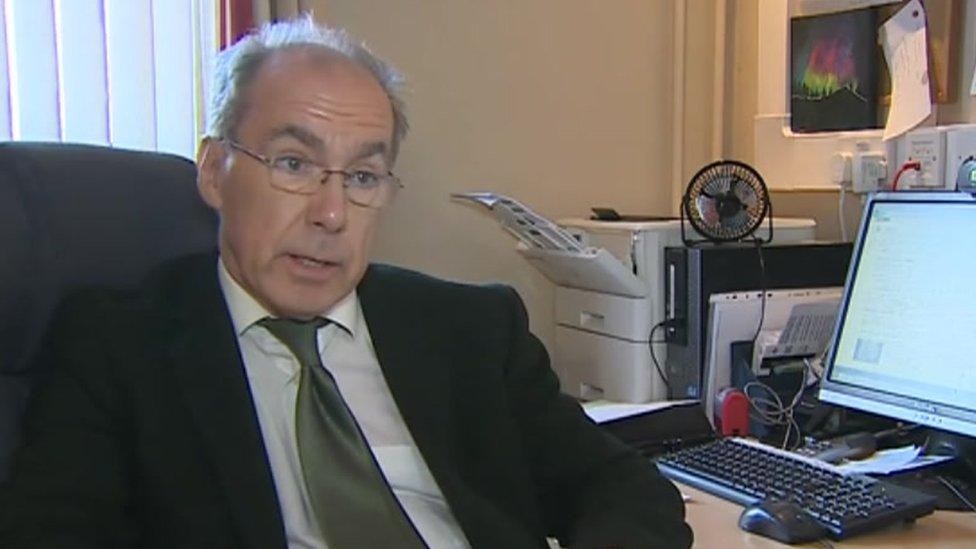'Quick-fix' drugs handed out over mental health delays
- Published

Anti-depressants are among drugs being prescribed by some GPs as "quick-fixes" due to delays accessing mental health therapy, a top GP in Wales has said.
The Royal College of GPs believes some colleagues have had little choice as referrals would take a few weeks.
Sixteen million mental health-related prescriptions were issued in 2017/18, up 4.4 million on 10 years ago.
The Welsh Government said extra funding has been given to improve access.
Dr Peter Saul, joint chair of Royal College of GPs Wales, said: "Counselling services and community mental health services are under strain.
"I can refer patients to talking therapies and it's often weeks before they can be assessed.
"I think the problem is some prescribing could be avoided if there was easier access to talking therapies."
Asked if prescriptions could be given out as a quick-fix option, Dr Saul said: "Absolutely."
The rise in the number of mental health-related prescriptions by GPs was the biggest jump across all categories over the 10-year period.
In total, 79.9m prescriptions were handed out in 2017/18, of which 16.3m were for cases related to mental health.
By comparison, figures for 2008/09 showed 11.9m of the of the 64.8m prescriptions were for mental health.

'Being able to talk would be the best solution'

Chloe Pearce, 20, has had two difference experiences of seeking help from GPs
Chloe Pearce was 13 when she went to see her GP seven years ago for help with anorexia.
She said she was able to talk through her problems and received therapy.
Last year, aged 19, she went back to the doctors suffering with anxiety and had a very different experience.
"I sat down and it was like a case of 'what do you want'?" she said.
"I was quite taken aback by that.
"We've got such little time in there and it seems offering medication as a very quick fix solution and be on your way.
"I wasn't really keen to take medication and I didn't follow up anything from that.
"I looked back at the tools I had been taught previously at therapy.
She added: "Having more time and being able to talk would be the best solution."

Dr Saul said he was not surprised to see the number of prescriptions as more people visit a GP due to better awareness of the issue.
But he said delays in receiving help was "removing a chance" for people to get better quicker.
"Counselling services and community mental health services are under strain," he added.
"I can refer patients to talking therapies and it's often weeks before they can be assessed.
"In an ideal world, we could try more counselling or I could give some medication or possibly both and I could get the counsellor to see them next Monday.
"But it's typically three or four weeks. It's not a chance."
Mind Cymru said it was "possible" prescriptions were being used as a stop-gap but it did not have statistical evidence.

Dr Peter Saul said prescribing could be avoided if it was easier to access therapy
It did however, survey more than 500 people who visited GPs for mental health help and found 44% came out with a prescription and 12% referred for talking therapy.
Simon Jones, the charity's head of policy, said: "There's an increase in people coming forward to talk to their GPs about mental health.
"The key is the choice of approach to take for the patient with mental health problems and how quickly that can be put in place.
"We know there's pressure on access to certain types of talking therapy.
"If you're in an area where there's a long waiting list or the service isn't available and that's when medication can be used."
The charity has also called for patients to start treatment within 28 days of requesting it.
A Welsh Government spokesman said: "We are committed to improving mental health services and are providing an extra £5.5m of funding to improve access to psychological therapies.
"Antidepressants are effective treatments, which when used appropriately help a large number of people.
"We expect GPs to use their clinical judgement in determining what course of treatment is appropriate for their patients, based on their individual needs and medical history."
- Published4 July 2018

- Published26 April 2018

- Published20 March 2018

- Published22 February 2018
